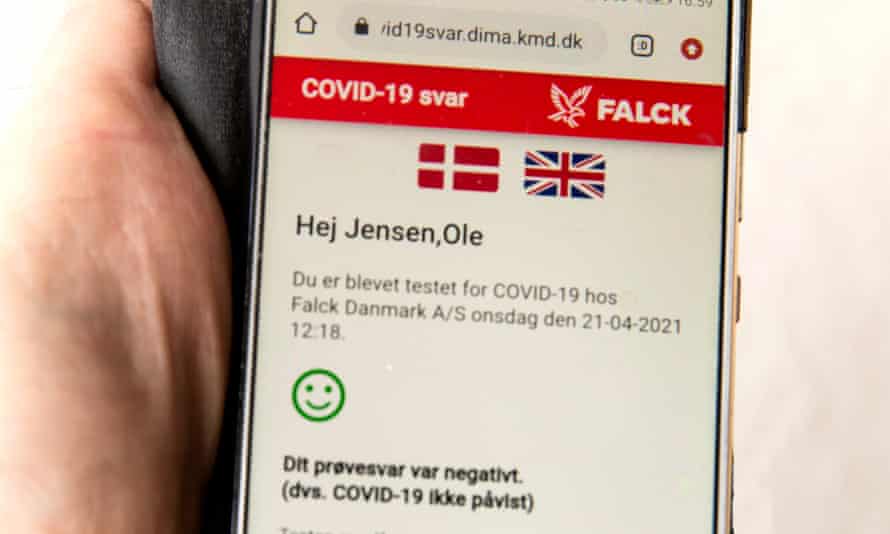Outside Forum, a concert venue turned coronavirus test centre in Copenhagen’s university district, the queue was starting to build up before a sunny Labour Day weekend.
As he waited, Casper Beckers, 25, was monitoring the WhatsApp group where the night’s festivities were being planned, starting with a board game bar, then cocktails.
“It’s huge, such a stark contrast,” he said of the shift since Denmark introduced its coronapas (coronavirus pass) system last month, allowing much of the country to open up.
“The bars are all open and I finally get to see people again almost like normal. Last time I was at a bar, it was crowded to a point that I thought it was a little bit irresponsible.”
Since 21 April, places such as bars, cafes, restaurants, museums, sports stadiums and tattooists have been open for anyone who can show a negative test result less than 72 hours old, or a completed vaccination, using a coronapas digital certificate.
Currently, people have to provide evidence via the MinSundhed (My Health) app, or on a paper printout. At the end of May, the digital coronapas will be released in its final form. It will also be enough for people to be able to show that they have tested positive for coronavirus and recovered within the previous 180 days.
Test centres have been set up in every district across the nation, allowing a record 1 million people to be tested last week – about one in every four adults. Many get tested several times a week.

Inside the concert hall, Beckers was guided to one of the 60 booths and was out again within 10 minutes. The result was expected to be on his phone in no more than half an hour.
This time he had only had to wait for a few minutes, but the queue can stretch to more than an hour (the waiting time can be checked on a website).
At the busy Spisebar 20 in the hip Nørrebro district, the owner Tanya-Maria Solskov said the return of her customers has been “amazing”. The only downside was that the different formats used by different test providers made it time-consuming to check documents.
“It almost requires us to have an extra person working down here,” she said. “I think they should support us with some extra money, because it’s normally not our responsibility, and we’re already struggling after they closed us down for four and a half months.”
The biggest opposition to the passes has come, predictably, from the Men in Black anti-lockdown activists, who have mounted near-weekly protests against Denmark’s restrictions.
Stephanie Risum, from the female Mammas in Black wing, boasts that she has been successfully flouting the coronapas requirement, for example by eating at the upmarket Café Viktor the day before without showing a pass or wearing a mask.
“You can just say ‘I’m exempted’ and under law they can’t ask you for proof,” she said. For her, the pass is simply a way of pressuring people to take the vaccine. “What they’re doing right now is they are forcing you to take a vaccine that you don’t trust, and we’re not going to do that.”
Back at Forum, though, Lindsay Lebensohn, 34, who had taken advantage of the reopening to have her hair dyed a vibrant purple, shared none of these concerns.
“We’re going to the Tivoli amusement park today because our kid just finished kindergarten yesterday,” Lebensohn said. “And then tomorrow she’s sleeping at her best friend’s place, so her parents can go out and get wasted.”
This content first appear on the guardian
